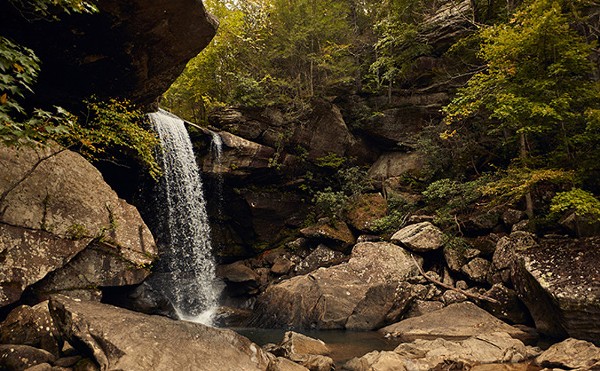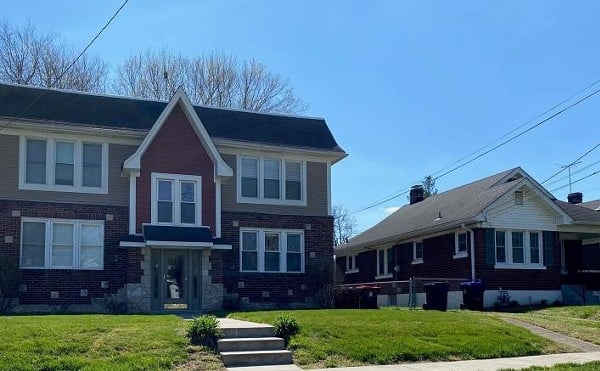Who’s watching our water?
The federal Clean Water Act turned 35 years old this month. While the country reflects on actions and attitudes toward water these days, a look closer to home shows a spotty approach to watersheds that needs improvement. Kentucky ranks No. 4 nationwide in number of inland waterways, but even our city misses the boat when it comes to watershed planning. Sewer sludge and sediment get a lot of attention, but other aspects of watershed ecology are too often disregarded.
Invasive plant species, and pollution that doesn’t come from a single source such as a sewer outlet, pose serious problems requiring keen attention and cold cash. The nonprofit Kentucky Waterways Alliance is working on development plans that include watersheds as more than a footnote. They’re starting with other parts of the state, however, leaving the Metro to work out problems of insufficient oversight on its own.
Louisville’s grip is tightening on a few problems. The Metro Sewer District is making a great and expensive effort to reduce pollutants for which MSD received hefty federal fines. For the moment, action occurs in direct correlation to that pressure to get Louisville in compliance with the Clean Water Act. At the same time, the parts of the watershed that don’t come through our taps appear to be low on the priorities list. Biologist positions at MSD remain vacant after layoffs in the past few years, and the job of getting a comprehensive look at Jefferson County’s 11 major watersheds has been farmed out to the University of Louisville. The school is scheduled to provide a report in December, an overdue update of the last one that occurred in 1999. Perhaps much more shouldn’t be expected from an organization whose moniker includes the operative word “sewer” rather than “watershed.”
But the Jefferson County Soil and Water Conservation District isn’t really in charge of it either. District conservationist Kurt Mason said the agency, a local arm of the U.S. Department of Agriculture, has no regulatory authority over its clients, mostly farmers, and so it can only encourage them to change practices that threaten the watershed. He said in nearly 30 years on the job, he’s seen landowners become increasingly receptive to thinking about what happens downriver. He sees less of that sentiment among developers, who have learned that lax enforcement of watershed rules means they can rip out trees along a waterway and get by with a simple apology.
“We don’t have the resources, neither the state nor MSD — to constantly go out and enforce, and then go back and enforce,” said Angela Kessans, Salt River basin coordinator for the Kentucky Division of Water. She organizes people and resources in the watershed region that includes Louisville, and she is optimistic about progress, even if watershed issues don’t get the financial and human resources they should.
But she did say educational efforts are making a difference. It’s true: People in the know seem to agree that ecological problems get more attention when average folks blow the whistle. —Jennifer Oladipo
Step It Up, literally
On Saturday, the Louisville Climate Action Network will play host to part two of the national Step It Up campaign aimed at getting Congress to take swift and aggressive action on global warming. Sarah Lynn Cunningham, co-founder of CAN, said the date was chosen to focus on the next election and put pressure on candidates to include climate change in their platforms. The events include what the group is referring to as participatory theater. The backdrop will include a picture hanging on a Louis XVI statue of the Louisville skyline superimposed on a desert with a shriveled Ohio River in the foreground. Participants will physically move around to represent the nation’s movement toward and away from environmental degradation throughout history, including ways Louisville has yet to reduce its carbon footprint.
Louisville mainstay danny flanigan will play live music, and Cunningham said they’ll try to keep the event short and sweet. It’s at 2 p.m. Saturday, rain-or-shine, in front of Metro Hall at 527 W. Jefferson St. —JO
A new approach to dog problems
Plans are under way to create a new “quick response” unit to respond to dangerous dog situations in targeted areas. Details are still being worked out, but the plan is to dedicate two Metro Animal Services employees to Metro Council District 5, the district with the highest number of reported dog bites, where they’ll canvas the area searching for problems and also be available for rapid dispatch. The MAS staffers will focus on emergency calls and will only respond to general calls in the area to which they are assigned.
The plan, which is being organized by Metro Council members Cheri Bryant Hamilton, D-5, and Kelly Downard, R-16, is a prototype and will be evaluated after a prescribed period. The MAS employees will drive a MAS vehicle and work the 3-11 p.m. shift because more incidents occur during that period. Residents will be notified about the effort and asked to help direct animal services staff to specific problems.
The plan is an effort to involve all parties that may have a role in public safety as it relates to dog problems: the police, the post office, citizens and other Metro departments. Some postal routes have been interrupted because of safety concerns about dogs. Additionally, citizens and public officials have complained about the lack of timely response to incidents involving dangerous dogs. —Cary Stemle
Left hand, meet right hand
Last Friday on the KET issues program “Comment on Kentucky,” during a general discussion of how attentive and generous governors have been to Louisville, Keith Runyon of The Courier-Journal’s editorial board said he is not sure Gov. Ernie Fletcher picked the best site for Louisville’s downtown arena. Now he tells us. —CS
Save some trees — use an appropriation. A group of protesters gathered for three hours or so outside the

The group offered up its Frederick Law Olmsted Award for Distinguished Leadership, a high honor that cost the senator tens of millions of dollars in appropriations over his 22 years in the Senate.
Besides the money — and conservation groups need money just like the rest of us — McConnell’s voting record on conservation and environmental issues is predictably abysmal. The League of Conservation Voters has consistently given him a zero rating. He votes in favor of exploitive mining practices like mountaintop removal, supports drilling for oil in the Arctic National Wildlife Refuge, cast a “yea” for President Bush’s 2003 Energy Policy (probably the most environmentally damaging in U.S. history, according to some experts), and wants to keep increasing funding to lace logging roads into America’s forests.
Seemingly, McConnell’s unbridled aggression toward preserving the planet would place him at odds with a group like the Olmsted Parks Conservancy, which is responsible for many of Louisville’s finest green spaces. Which prompts a philosophical question: When money is the gold standard, is there any objective reality?





